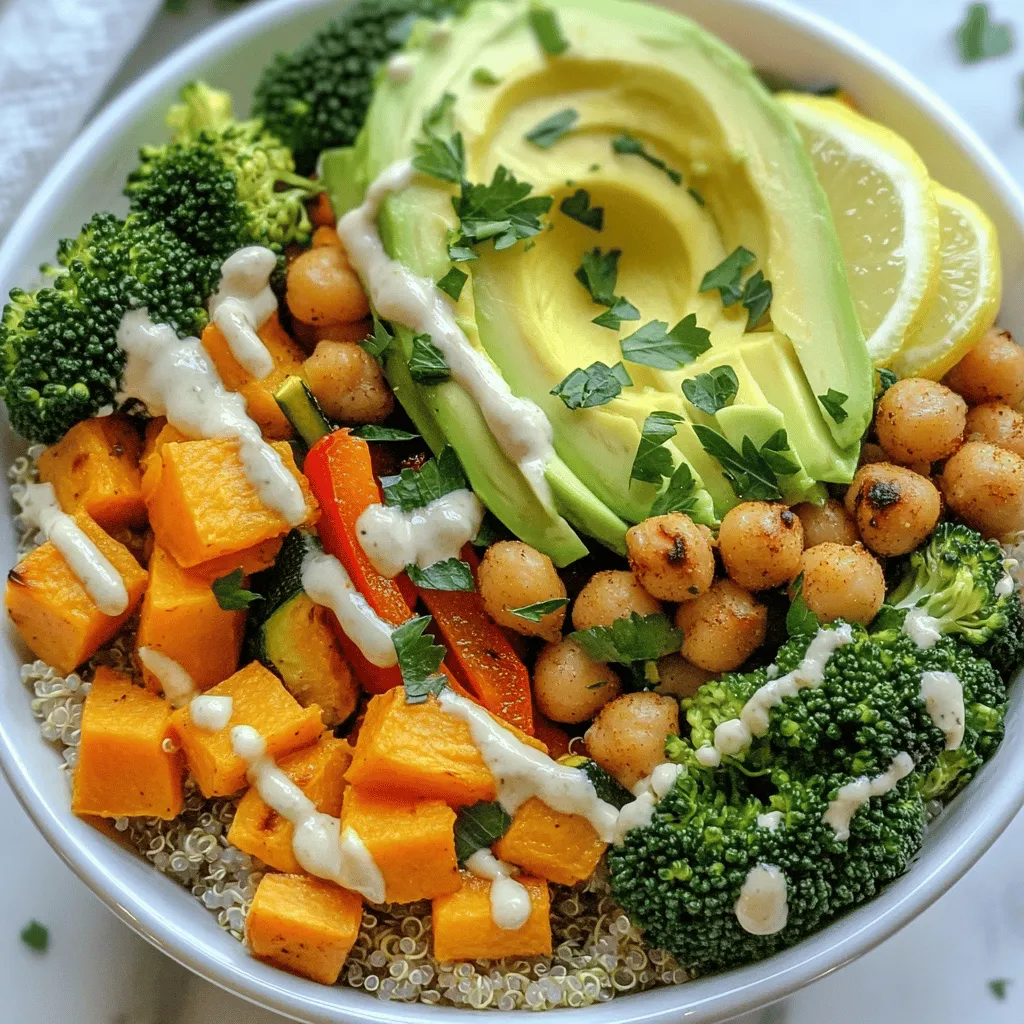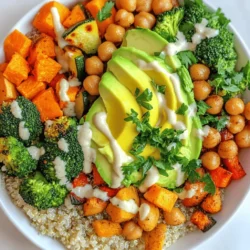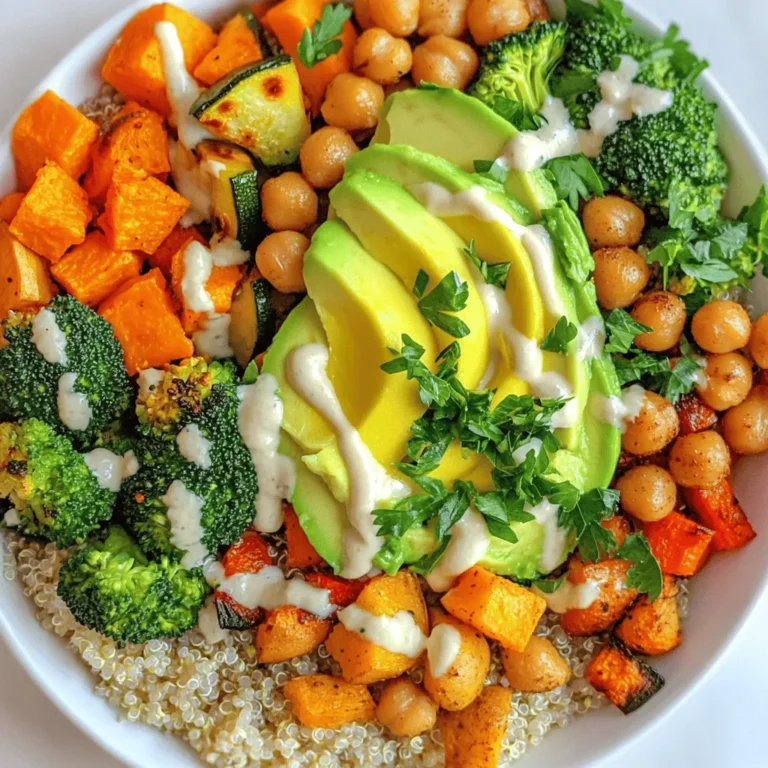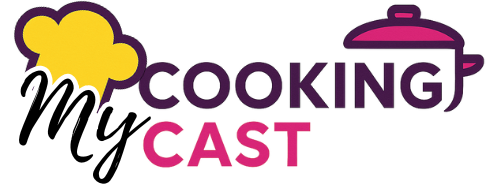Looking for a quick and healthy meal? Roasted Veggie Buddha Bowls are the answer! These bowls are colorful, tasty, and packed with nutrients. You can customize them to fit your taste. In this post, I will guide you through the simple steps of making these delicious bowls at home. Grab your ingredients and get ready for a meal that’s both easy and satisfying!
Ingredients
List of Ingredients
– 1 medium sweet potato, peeled and diced
– 1 cup broccoli florets
– 1 red bell pepper, chopped
– 1 zucchini, sliced
– 1 cup quinoa, rinsed
– 2 cups vegetable broth or water
– 2 tablespoons olive oil
– 1 teaspoon smoked paprika
– 1 teaspoon garlic powder
– Salt and pepper to taste
– 1 avocado, sliced
– 1 cup chickpeas, drained and rinsed
– Fresh lemon juice (from 1 lemon)
– Fresh parsley for garnish
Nutritional Information
This meal is packed with nutrients. It includes healthy carbs from sweet potatoes and quinoa. The veggies add fiber and vitamins. Each serving offers protein from chickpeas. This bowl is well-balanced for energy and health. It’s perfect for a filling lunch or dinner.
Ingredient Notes & Substitutions
– Sweet Potato: You can swap it with butternut squash for a different flavor.
– Quinoa: If you want, use brown rice or couscous instead.
– Chickpeas: Black beans or lentils work great if you prefer.
– Veggies: Feel free to mix in any seasonal veggies you love.
– Olive Oil: Avocado oil or coconut oil can replace olive oil.
– Herbs: You can use cilantro or basil instead of parsley for garnish.
This recipe is flexible, so try different ingredients based on what you have. Enjoy making it your own!
Step-by-Step Instructions
Preparing the Oven and Vegetables
Start by preheating your oven to 425°F (220°C). This high heat helps the veggies get nice and crispy. While the oven heats, chop your vegetables. I use sweet potato, broccoli, red bell pepper, and zucchini. You can use any veggies you love. Place them on a large baking sheet. Drizzle with olive oil and sprinkle smoked paprika, garlic powder, salt, and pepper. Toss them well to coat. Spread the veggies out in a single layer. This helps them roast evenly.
Cooking Quinoa
As the veggies roast, it’s time to cook the quinoa. Bring two cups of vegetable broth or water to a boil in a medium saucepan. Rinse one cup of quinoa under cold water. Add the rinsed quinoa to the boiling liquid. Reduce the heat to low, cover, and let it simmer for 15 minutes. When done, the quinoa should be fluffy, and all the liquid should be gone. Turn off the heat and let it sit covered for five minutes.
Assembling the Buddha Bowls
Now for the fun part: assembling your Buddha bowls! Take a serving bowl and add a scoop of quinoa at the bottom. Next, layer on your roasted vegetables. I like to add sliced avocado and chickpeas on top for protein. To make it pop, squeeze some fresh lemon juice over everything. Finally, garnish with fresh parsley for a touch of color. Serve warm and enjoy!
Tips & Tricks
Best Practices for Roasting Vegetables
Roasting brings out the natural sweetness of veggies. To get the best results, cut all vegetables into even sizes. This helps them cook at the same rate. Always preheat your oven to 425°F for a nice, crispy finish. Use enough olive oil to coat the veggies well, but don’t drown them. A light drizzle works best. Don’t forget to stir the veggies halfway through roasting. This helps them cook evenly and get that lovely caramelization.
Cooking Quinoa Perfectly
Cooking quinoa is simple, but it can go wrong if you aren’t careful. Start by rinsing quinoa in cold water. This removes a bitter coating. Then, use a 2:1 ratio of liquid to quinoa. If you want more flavor, use vegetable broth instead of water. Bring the broth to a boil, then reduce the heat and cover the pot. Let it simmer for about 15 minutes. Once it’s done, remove it from heat and let it sit for 5 minutes. Fluff with a fork to get a light texture.
How to Customize Your Buddha Bowls
Buddha bowls are all about personal taste. Feel free to swap in your favorite veggies. Carrots, Brussels sprouts, or cauliflower work great too. You can also change the protein. Try beans, tofu, or even grilled chicken. For extra flavor, add a drizzle of tahini or your favorite dressing. Fresh herbs like cilantro or basil can also add a nice touch.

Variations
Different Vegetables to Use
You can mix and match many veggies in your Buddha bowl. Try using root veggies like carrots and beets for sweetness. Leafy greens like spinach or kale add a fresh touch. Brussels sprouts give a nice crunch and flavor. You may also add seasonal veggies like asparagus in spring or squash in fall. The key is to use what you love!
Protein Alternatives and Add-ons
Chickpeas are a great choice, but you can switch it up. Try black beans for a hearty bite or lentils for a protein boost. Tofu works well, too, especially when marinated and roasted. For a meat option, grilled chicken or shrimp can be tasty. These proteins make your bowl filling and balanced.
Dressing and Flavor Boosters
Dress up your Buddha bowl with fun sauces. A simple lemon-tahini dressing adds creaminess. You can also try a spicy sriracha drizzle for a kick. Fresh herbs like cilantro or basil brighten the flavors. Nuts and seeds like pine nuts or pumpkin seeds add crunch and healthy fats. With these options, you can create a bowl that’s uniquely yours.
Storage Info
How to Store Leftovers
After you enjoy your roasted veggie Buddha bowls, let them cool. Place any leftovers in an airtight container. Store them in the fridge for up to four days. Make sure the veggies and quinoa are separate if possible. This keeps them fresh and tasty.
Reheating Instructions
To reheat, use the microwave or oven. If using the microwave, warm the bowl for 1-2 minutes. Stir halfway through to heat evenly. If you prefer the oven, set it to 350°F (175°C). Place the bowl in for about 10 minutes. This method keeps the veggies crisp and the quinoa fluffy.
Freezing Tips
You can freeze leftovers, but only the quinoa and roasted veggies. Avoid freezing fresh avocado and chickpeas. Pack the cooled quinoa and veggies in a freezer-safe bag. Remove as much air as you can. They will stay fresh for up to three months. When you’re ready to eat, thaw them overnight in the fridge before reheating.
FAQs
What are Buddha Bowls?
Buddha bowls are colorful bowls filled with grains, veggies, and protein. They offer a full meal in one dish. You can mix different textures and flavors. The idea is to create balance and nourishment.
Can I make Buddha Bowls ahead of time?
Yes, you can make Buddha bowls ahead of time. Prepare the grains and roasted veggies in advance. Store them in separate containers in the fridge. When ready to eat, just assemble and add fresh toppings.
How to make the best roasted veggie Buddha bowls?
To make the best roasted veggie Buddha bowls, focus on flavor and texture. Use fresh, seasonal veggies for the best taste. Roast them until they are golden and tender. Layer your bowls with fluffy quinoa and chickpeas for protein.
What are some healthy toppings for Buddha bowls?
Healthy toppings for Buddha bowls include:
– Sliced avocado
– Fresh greens like spinach or arugula
– Nuts or seeds for crunch
– A drizzle of tahini or yogurt
– Fresh herbs like parsley or cilantro
These toppings add flavor, nutrition, and a beautiful look to your dish.
In this blog post, we explored Buddha bowls. We covered their ingredients, cooking steps, and tips. You learned how to roast veggies, cook quinoa, and assemble bowls. We also discussed fun variations and storage tips.
Buddha bowls are flexible and fun. You can mix flavors and make them your own. Remember, the key is to enjoy your meal! Try different veggies, proteins, and dressings. Happy cooking!


